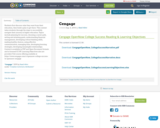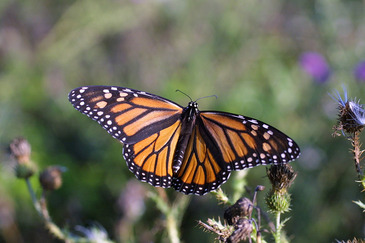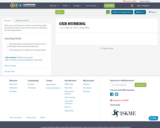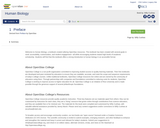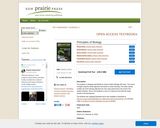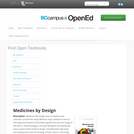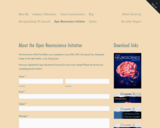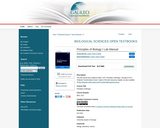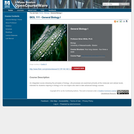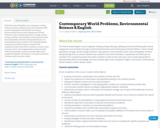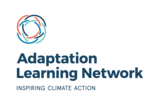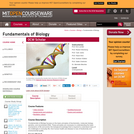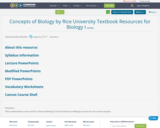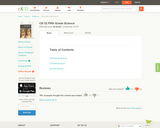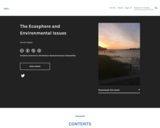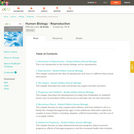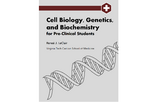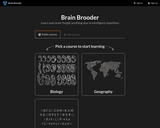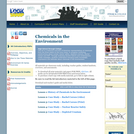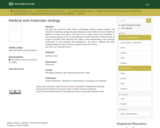Cell Biology, Genetics, and Biochemistry for Pre-Clinical Students (2021) is an undergraduate medical-level resource for foundational knowledge across the disciplines of genetics, cell biology and biochemistry. This USMLE-aligned text is designed for a first-year undergraduate medical course that is delivered typically before students start to explore systems physiology and pathophysiology. The text is meant to provide the essential information from these content areas in a concise format that would allow learner preparation to engage in an active classroom. Clinical correlates and additional application of content is intended to be provided in the classroom experience. The text assumes that the students will have completed medical school prerequisites (including the MCAT) in which they will have been introduced to the most fundamental concepts of biology and chemistry that are essential to understand the content presented here. This resource should be assistive to the learner later in medical school and for exam preparation given the material is presented in a succinct manner, with a focus on high-yield concepts.
The 276-page text was created specifically for use by pre-clinical students at Virginia Tech Carilion School of Medicine and was based on faculty experience and peer review to guide development and hone important topics.
Available Formats
978-1-949373-42-4 (PDF)
978-1-949373-43-1 (ePub) [coming soon]
978-1-949373-41-7 (Pressbooks) https://pressbooks.lib.vt.edu/cellbio
Also available via LibreTexts: https://med.libretexts.org/@go/page/37584
How to Adopt this Book
Instructors reviewing, adopting, or adapting parts or the whole of the text are requested to register their interest at: https://bit.ly/interest-preclinical.
Instructors and subject matter experts interested in and sharing their original course materials relevant to pre-clinical education are requested to join the instructor portal at https://www.oercommons.org/groups/pre-clinical-resources/10133.
Features of this Book
1. Detailed learning objectives are provided at the beginning of each subsection
2. High resolution, color contrasting figures illustrate concepts, relationships, and processes throughout
3. Summary tables display detailed information
4. End of chapter lists provide additional sources of information
5. Accessibility features including structured heads and alternative-text provide access for readers accessing the work via a screen-reader
Table of Contents
1. Biochemistry basics
2. Basic laboratory measurements
3. Fed and fasted state
4. Fuel for now
5. Fuel for later
6. Lipoprotein metabolism and cholesterol synthesis
7. Pentose phosphate pathway (PPP), purine and pyrimidine metabolism
8. Amino acid metabolism and heritable disorders of degradation
9. Disorders of monosaccharide metabolism and other metabolic conditions
10. Genes, genomes, and DNA
11. Transcription and translation
12. Gene regulation and the cell cycle
13. Human genetics
14. Linkage studies, pedigrees, and population genetics
15. Cellular signaling
16. Plasma membrane
17. Cytoplasmic membranes
18. Cytoskeleton
19. Extracellular matrix
Suggested Citation
LeClair, Renée J., (2021). Cell Biology, Genetics, and Biochemistry for Pre-Clinical Students, Blacksburg, VA: Virginia Tech Publishing. https://doi.org/10.21061/cellbio. Licensed with CC BY NC-SA 4.0.
About the Author
Renée J. LeClair is an Associate Professor in the Department of Basic Science Education at the Virginia Tech Carilion School of Medicine, where her role is to engage activities that support the departmental mission of developing an integrated medical experience using evidence-based delivery grounded in the science of learning. She received a Ph.D. at Rice University and completed a postdoctoral fellowship at the Maine Medical Center Research Institute in vascular biology. She became involved in medical education, curricular renovation, and implementation of innovative teaching methods during her first faculty appointment, at the University of New England, College of Osteopathic Medicine. In 2013, she moved to a new medical school, University of South Carolina, School of Medicine, Greenville. The opportunities afforded by joining a new program and serving as the Chair of the Curriculum committee provided a blank slate for creative curricular development and close involvement with the accreditation process. During her tenure she developed and directed a team-taught student-centered undergraduate medical course that integrated the scientific and clinical sciences to assess all six-core competencies of medical education.
Accessibility Note
The University Libraries at Virginia Tech and Virginia Tech Publishing are committed to making its publications accessible in accordance with the Americans with Disabilities Act of 1990. The HTML (Pressbooks) and ePub versions of this book utilize header structures and include alternative text which allow for machine-readability.
Please report any errors at https://bit.ly/feedback-preclinical
